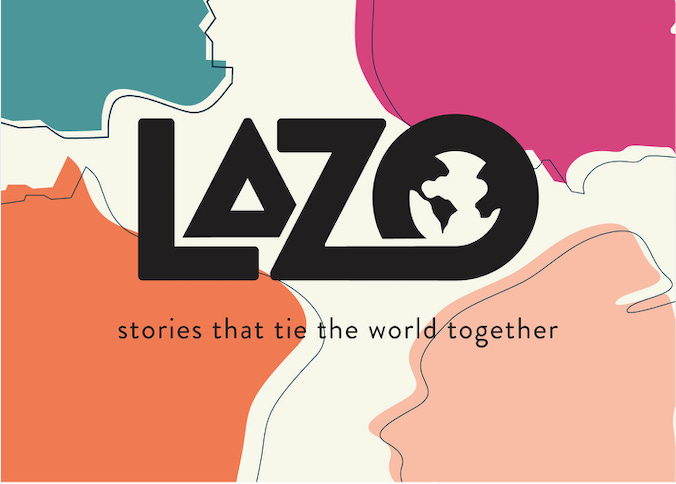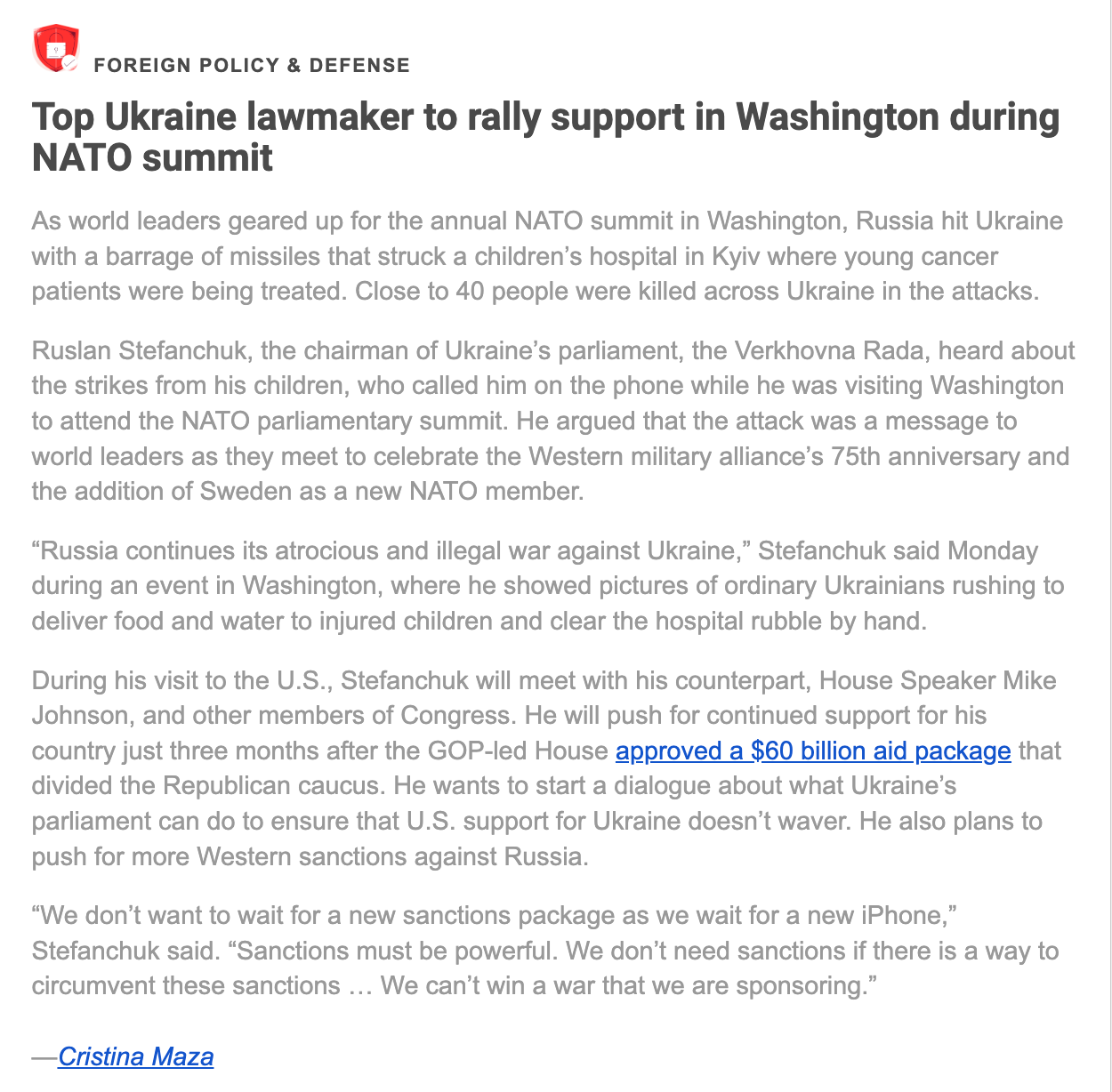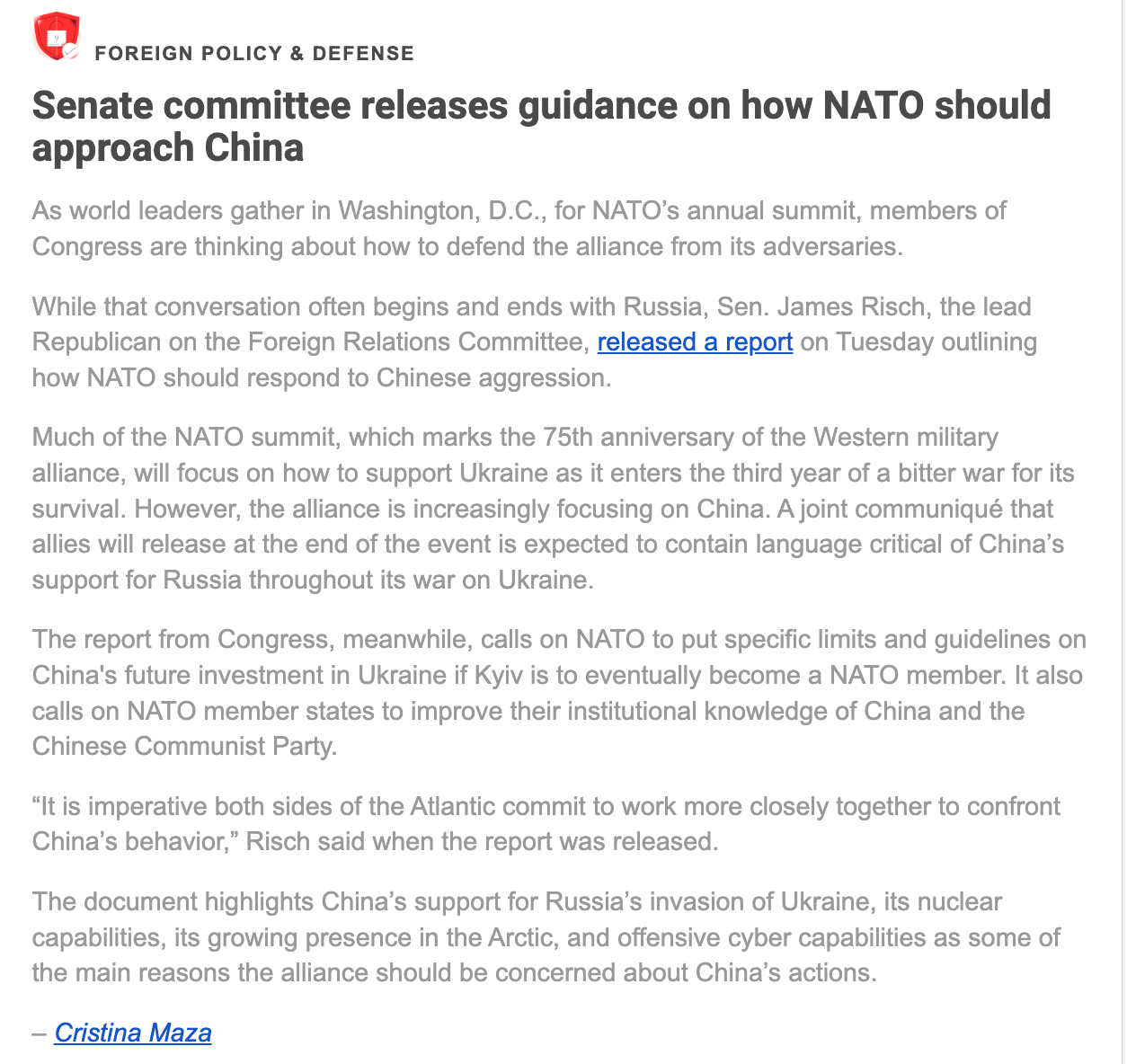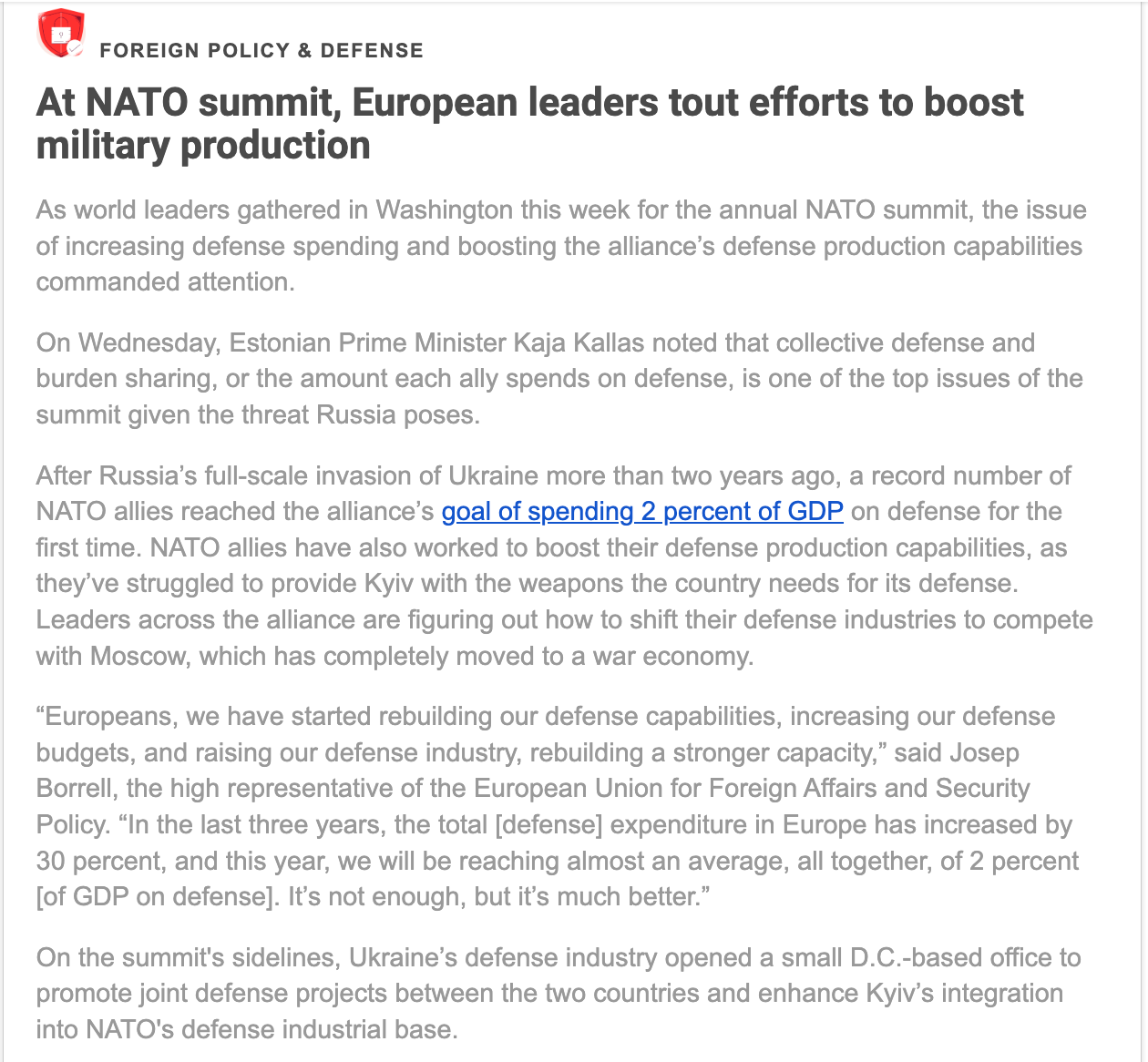An unexpected source of solidarity during the NATO summit.
The NATO summit in Washington, D.C., was hot. And I don’t mean in a sexy way. I spent the week chasing world leaders and traipsing down cordoned streets in 95-degree (35 C) heat, with the sun beating down on me, choked by unbearable humidity, often while wearing a suit jacket.
The streets around the summit were blocked off for obvious security reasons, so those attending without a motorcade had to take a bus or car as close to the venue as possible and then walk. One NATO official told me that he and his colleagues were transporting boxes to the venue when their taxi, unable to get past police blockades, promptly left them on the sweltering streets, forcing them to carry their cargo for blocks in their tailored suits.
One evening, with my bangs plastered to my forehead with sweat, I found myself seated directly behind Belgian Prime Minister Alexander De Croo and the European Union’s High Representative for Foreign Affairs and Security Policy, Joseph Borrell, on a rooftop during a several-hour-long event with no air conditioning whatsoever and practically no shade.
On the (very, very) bright side, the weather was a perfect conversation starter during the week’s innumerable networking events. We watched the ice melt in our cocktails before we had time to take the first sip. We were all suffering together, and it created a strange atmosphere of solidarity amidst the stench of sweat.
What I’m writing:
• I wrote about everything Ukraine did and didn’t get from this year’s NATO summit. Even though the country isn’t a NATO member, officials said Ukraine was the summit's priority No. 1, 2, and 3. This piece is free to read.
My weekly news blurbs:
What I’m reading:
• U.S. military bases across Europe were placed on a rare, heightened state of alert last week after the U.S. received intelligence that Russian-backed actors were considering carrying out sabotage attacks against U.S. military personnel and facilities, CNN reports.
• U.S. intelligence discovered earlier this year that the Russian government planned to assassinate the chief executive of a German arms manufacturer that has been producing weapons for Ukraine, CNN reports.
• At the end of Prime Minister Narendra Modi’s visit to Moscow, Russia promised an early release for all Indian citizens in its military, the BBC reports. Indian citizens claim they were lured to Russia on the promise of non-combat jobs but were later forced into active combat.
• Russia declared the English-language newspaper The Moscow Times an "undesirable organization," DW reports. Cooperating with the outlet can entail sentences of up to five years in prison.
• A court in Moscow ordered Yulia Navalnaya, the wife of late Russian opposition politician Alexei Navalny, to be arrested in absentia, the BBC reports.
• Finnish lawmakers narrowly approved a controversial bill that will allow border guards to turn away third-country migrants attempting to enter from neighboring Russia and reject their asylum applications because Helsinki says Moscow is orchestrating an influx of migrants to the border. The Associated Press has the story.
• Belarus and China began 11 days of joint military training exercises just miles from the Polish border, CNN reports.
• The European Union has “stopped” Georgia’s accession process “for now,” Brussels’ envoy Paweł Herczyński said at an EU enlargement event in Tbilisi. Politico Europe has the story.
• Turkish President Tayyip Erdoğan said that Turkey will invite Syrian President Bashar al-Assad “any time” for possible talks to restore bilateral relations, Reuters reports.
• A loose alliance of leftist parties won the most seats in French legislative elections after a second round of voting, Al Jazeera reports. While the coalition managed to keep the French far-right out of power and even forced them into third place, no single political party or alliance won a clear majority.
• French President Emmanuel Macron reportedly called Israeli Prime Minister Benjamin Netanyahu and protested the “unacceptable interference” in the French elections, writes the Middle East Monitor. Israel’s Diaspora Minister Amichai Chikli openly supported far-right National Rally leader Marine Le Pen, whose party was co-founded by a Nazi.
• Members of the European Parliament from France’s far-right National Rally are set to join the newly-founded Patriots for Europe, making the far-right group the third-largest in the European Parliament, Politico Europe reports. Italy’s Lega Party also joined.
• A new far-right group, Europe of Sovereign Nations, was also founded in the European Parliament, Politico Europe reports. The alliance, led by Germany’s far-right Alternative for Germany (AfD) and Poland’s Confederation, has 25 MEPs.
• The new Labour government in the United Kingdom will drop a bid to challenge the International Criminal Court’s decision to issue arrest warrants for Netanyahu over alleged war crimes, the Guardian reports. Sources say Prime Minister Keir Starmer’s government believes the ICC holds jurisdiction over Gaza, contrary to the previous government.
• The outgoing chief of Israel’s Central Command condemned the rising “nationalist crime” among Jewish settlers in the West Bank and criticized the Israeli government for trying to cripple the Palestinian Authority financially. The Times of Israel has the story.
• The United States added new individuals and organizations to a growing sanctions list of violent Israeli settlers, the Guardian reports. The new entities include the far-right Lehava group and two founding members of Tsav 9, a campaign group that has blocked humanitarian aid from entering Gaza.
• Canada urged the Israeli government to reverse a decision to approve new settlement outposts in the West Bank. G7 Foreign Ministers also denounced Israel’s move to expand its settlements in the West Bank.
• Israeli Prime Minister Benjamin Netanyahu toughened his demands for a ceasefire and hostage deal just as optimism for a deal was growing after Hamas softened its stance, Axios reports.
• Many residents in Gaza City are remaining despite Israel’s recent evacuation orders, fearing the potential dangers from Israeli forces on the evacuation routes and doubting there is safety in the south, the New York Times reports.
• Reformist candidate Masoud Pezeshkian won Iran’s presidential elections, defeating his ultraconservative rival, the Washington Post reports. Pezeshkian campaigned for more social freedoms and engagement with the West, calling his victory the start of “a new chapter” for Iran.
• The New Left Review has an interesting look at how Pezeshkian’s election came to be.
• Iran is attempting to covertly stoke protests in the United States related to the Gaza war by posing as activists online and providing financial support to protesters, the U.S. Director of National Intelligence Avril Haines said.
• An Iraqi court issued a death sentence against a widow of the self-styled Islamic State leader, Abu Bakr al-Baghdadi, alleging that she was complicit in crimes committed against Yazidi women captured by the militant group, the Associated Press reports.
• Kenyan President William Ruto fired almost his entire cabinet following weeks of deadly protests over government corruption and tax hikes, the Washington Post reports.
• The military junta leaders of Niger, Mali, and Burkina Faso ruled out returning to the ECOWAS regional bloc, the Associated Press reports.
• The U.S. military withdrew its personnel from Niger’s Air Base 101 near the airport in the capital Niamey, ahead of its exit from a major drone base in the coming weeks, Reuters reports.
• Uganda is supporting M23 rebels fighting across its border in the eastern Democratic Republic of Congo, the BBC reports.
You can write to me for any reason: c.maza@protonmail.com.










